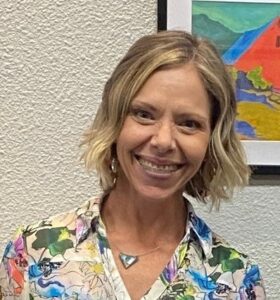I recently met Tiffany Paige Ramirez, founder and Creative Director of the non-profit Artisan Mind, during an event hosted by the Professional Fiduciary Association of California. After hearing her talk, it was clear she was someone we needed to know: Her goal is to provide creative experiences that support the hope and faith of people living with physical and cognitive challenges, which falls in line with the goal of our Closure Map workbook.
Below, I asked for her advice on art as a connection tool, documenting family stories, and the magic of music.
~Heidi
First4 Questions with Tiffany Paige Ramirez

We know you use art as a connection tool with your clients, but could you share a few specific ways that family caregivers could adapt your approach to tap into loved ones’ hidden memories?
Tiffany’s Response:
Family caregivers can use simple, familiar art materials like paints or clay to help unlock memories by focusing on themes or objects that hold personal significance. Asking open-ended questions during the creative process can guide loved ones to reconnect with hidden memories. Art appreciation, such as looking through coffee table books filled with beautiful images, can also inspire connections to beauty and evoke past experiences. This process fosters a deeper bond and helps bring memories to the surface through artistic expression.
Describe the importance of documenting family stories early in a dementia diagnosis.
Tiffany’s Response:
Documenting family stories early on is a gift—for both the person with dementia and their loved ones. It’s a way to hold on to precious memories, preserving the essence of who someone is before those details start to fade. Through art, we can help capture these stories visually—whether through portraits, family history collages, or simple sketches that bring these moments to life. This documentation can be comforting and grounding, not just for the person with dementia but also for their family, giving them a way to reconnect when words become harder to find. These stories, when shared early, create lasting memories that remain a part of the person’s identity as time passes.
One of our Closure Map steps is the Magic of Music, specifically creating playlists or documenting favorite songs so our families can remember us through our musical memories. You also mentioned that music is valuable for your clients. How do you see using music as a tool to bring joy to clients with dementia?
Tiffany’s Response:
We use background music during sessions to create a relaxed, creative environment, helping clients connect to memories and inspire self-expression. Music, combined with art, can spark joy, evoke emotions, and help people with dementia express themselves in a meaningful way. Personalized playlists also allow caregivers to connect their loved ones to past moments of significance.
In your presentation at the Professional Fiduciary Association of California, you mentioned the importance of connecting clients to their faith/spirituality. Share why this is so important to you.
Tiffany’s Response:
As believers in Jesus, we understand the profound peace that comes from knowing God, and we believe it’s vital to help clients stay connected to their faith. Spirituality provides comfort, purpose, and identity, even as memory fades. We integrate spiritual themes into creative activities to help clients express their beliefs, providing a space where they can continue to feel loved and connected to what matters most to them.
About Tiffany:
Tiffany Paige Ramirez is the Founder and Executive Director of the non-profit, Artisan Mind. She is dedicated to providing creative experiences that support meaning, hope and individuality of older adults and has a special heart for those living with physical and cognitive challenges.
She holds a Bachelor of Fine Arts from Parson’s School of Design and worked in the design industry until her calling into creative arts care. Moved by the loss of her grandfather to Alzheimer’s and her awakening to faith, Tiffany started pursuing her call to bring the healing properties of art and imagination to the lives of people living with dementia.
Tiffany launched the first satellite division of ARTZ: Artists for Alzheimer’s in Sacramento in 2011 and then founded Artisan Mind in 2014. She is responsible for initiating an art liaison program for hospice care and developing numerous person-centered creative enrichment programs throughout Northern California.
Tiffany is committed to raising awareness of the value of creativity and faith for people living in senior care communities and memory care neighborhoods, as well as reaching care partners, support groups, and spiritual organizations. Her work has been recognized by CALA (California Assisted Living Association) and the County of Sacramento with the Hero of Human Services Award.


